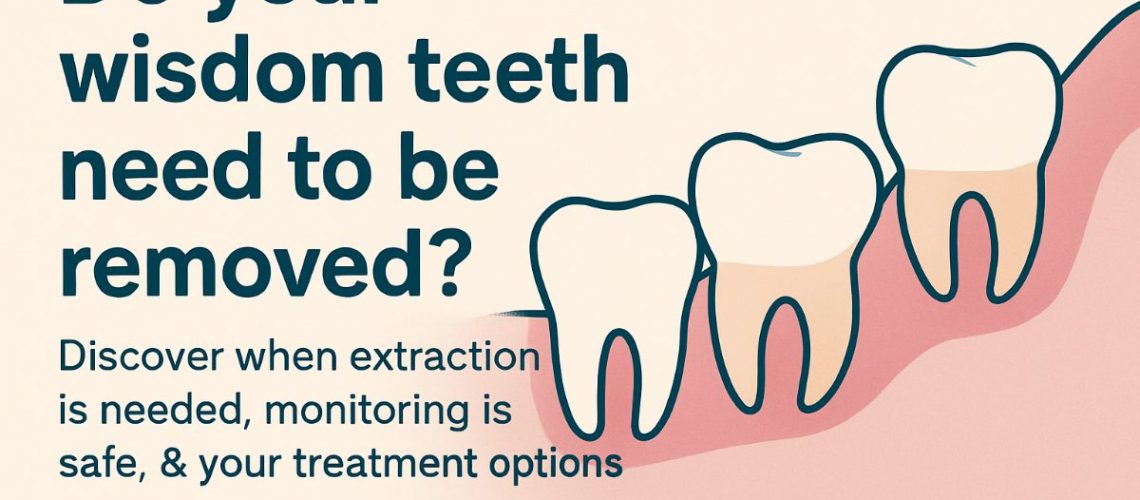A common question is whether wisdom teeth need to be removed. The answer depends on symptoms, the tooth’s position, the risk to nearby teeth, and your overall oral health. This post explains when extraction is needed, when careful monitoring is safe, and what treatment options look like so you can make an informed decision.
What are wisdom teeth?
Wisdom teeth are the third molars that usually come in between ages 17 and 25. They are the last teeth to erupt, so many mouths don’t have enough room. Because they can grow at odd angles or stay trapped under the gum or bone, they often cause problems for some people while others never notice them.
Why dentists often recommend removal
Impaction and crowding
Impacted wisdom teeth are those that don’t fully erupt and can push on adjacent teeth or remain trapped under the gum or bone. This pressure can cause pain and crowding or move other teeth out of alignment.
Infection and gum disease
Partially erupted wisdom teeth create a flap of gum that traps food and bacteria. Those areas are hard to clean and can lead to repeated infections, swelling, and bad breath.
Decay and cysts
Because wisdom teeth are hard to reach, they are at higher risk of tooth decay. Cysts can also form around an unerupted wisdom tooth and damage nearby teeth and bone if left untreated.
Signs that wisdom teeth need to be removed
Watch for symptoms that suggest removal is needed. If you have any of these, talk to your dentist or oral surgeon about treatment options.
- Persistent pain near the back of the mouth
- Swelling of the gum or jaw
- Repeated infections or bad breath
- Decay on the wisdom tooth or on adjacent teeth
- Cysts visible on X-rays
- Orthodontic concerns or damage to nearby teeth
When you may not need extraction
Not all wisdom teeth need to be removed. If a wisdom tooth is fully erupted, healthy, aligned, and easy to clean, many dentists recommend monitoring it with regular exams and X-rays. Age matters: younger patients usually heal faster and have fewer complications. Older patients may face slower recovery and more complex surgery if problems develop later.
Risks of leaving problematic wisdom teeth untreated
- Chronic or recurrent infection
- Damage or decay of nearby teeth
- Cyst formation and bone loss
- More complex and riskier surgery later
- Potential spread of infection to surrounding tissues
Treatment options and the specialists who perform them
Treatment ranges from a simple extraction in the dentist’s chair to a surgical removal that may require cutting bone or stitches. Options for anesthesia include local anesthesia, oral sedation, IV sedation, or general anesthesia depending on complexity and patient comfort.
Oral and maxillofacial surgeons handle complex wisdom tooth extractions. For wisdom tooth care, consult specialists like Dr. Ryan McCloy. If a tooth is lost and an implant is later considered, implant planning and placement can be done with CT-guided techniques and IV sedation—consult with Dr. Edward Halusic for implant options and advanced planning.
Questions to ask your surgeon
- Do my wisdom teeth need to be removed now?
- What are the risks and benefits of extraction vs. monitoring?
- What anesthesia do you recommend for me?
- How long is recovery and what should I expect after surgery?
- What happens if I delay treatment?
- If a tooth is lost, will I need an implant later?
Finding expert care and next steps
If you’re unsure whether your wisdom teeth need to be removed, schedule a consultation with an oral surgeon to review X-rays and your symptoms. New Smile Now focuses on safe, CT-guided planning, full anesthesia options, and clear treatment plans. Their team—featuring specialists like Dr. McCloy and Dr. Halusic—can help you weigh the options and choose the best path for your health. Book an evaluation to get a personalized plan and next steps.

